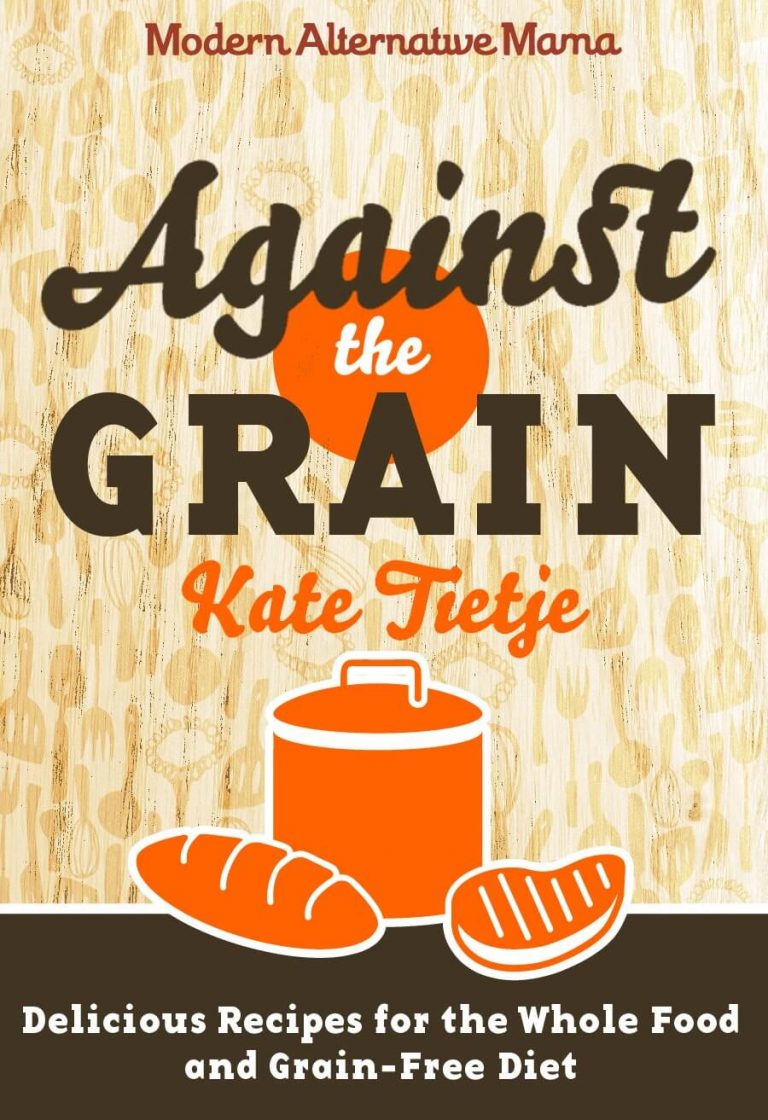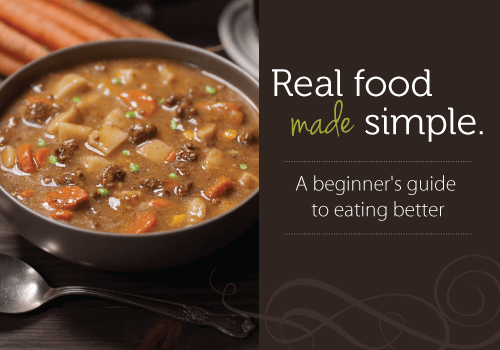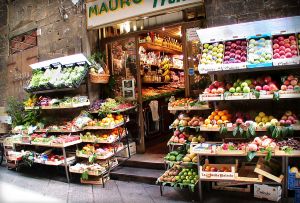You Tell Me: How Do You Make a Whole Foods Diet Work on a Budget?

I'll confess… I have another new project up my sleeve. As if it's not enough to be having another baby and starting a new family business, I've decided to write another eBook, just for fun! 🙂
The concept of my new book is a collection of all the different ideas, tips, tricks, budgeting methods, cooking styles, gardening and preserving helps, shopping resources, general frugality, even recipes, etc. that I have learned over the past 6 years as a young wife and mom, as I do my best to serve nourishing, nutritious, whole foods to my family on a limited budget!
I know that this is an incredibly timely topic, as we all feel the budget crunch of the economy and the current tough financial times (and maybe tougher yet to come). It feels so relevant to me right now, and I'm sure it is a concern for many or even most of you as well. The challenge for us is figuring out how to continue to serve our families healthful foods for less money, without making compromises and being enticed by all of the cheap processed and nutritionally empty foods that are out there.
Though I have many of my own ideas and topics for the book already, one thing that I would love to include this time is wisdom and advice from an incredibly abundant source: YOU! My faithful readers, who are full of so much good information and knowledge!
What would I like from you?
- Your best advice on buying and serving healthy foods on a budget!
- The tips that you would give to young wives and moms just starting out (even if you're just starting out yourself!)
- The things you do that you believe save you the most money, and allow you to buy the highest quality whole foods.
- Your favorite ways to make things stretch and get the most out of your food dollars.
- All the little ways that you practice frugality in your kitchen.
- What you wish someone else had told you!
My one request is that you only leave a comment for me of this nature if you are comfortable with me publishing it as a quote in my new eBook. It won't be practical for me to directly contact every single person who comments, and I would like to freely use the quotes that I think would add to the book. If you would leave a name that you are comfortable with me using when/if I quote you (it doesn't have to be your real name, and last names aren't necessary), as well as where you're from (only if you're comfortable with that), that would be fantastic!
Thanks, ladies! I can't think of a better group of women to ask this question to, and I know that you have such a wealth of knowledge to offer!






Ooohh–I am so excited to see what everyone says!
I just posted today along these lines–managing a small budget.
We are blessed to live in Amish country (Northern Indiana), so we can get a lot of good, organic or chemical-free, produce at very good prices. Sometimes it is hard to find where they are, but once you find an Amish area there are usually a lot of roadside stands that are worth the drive. It can be a great cultural and educational experience for children, too!
I’ve also gotten free produce from my generous neighbors on Freecycle. That’s a great resource for all sorts of used, free stuff.
This is such a great topic! Thanks for discussing it. Although it has been said time and again, the basic methods of staying within a budget still hold true.
1. Plan your meals,
2. eat in season,
3. make a list (even when going to the farmer’s market),
4. get to know your local farmers and finally,
5. get some like minded friends who will spend afternoons canning with you, buying in bulk and splitting the cost, etc.
It kind of goes without saying, but I thought that I should add, we as a family have saved lots of money since I learned to cook and make dinner every night. We use the leftovers for lunch. Eating out is a special occasion and must come with coupons:)
Prioritize! What’s most important to you? As a young couple (with no children) and my husband still in school, we have a fairly limited budget to work with. Perhaps the most effective way to get the most out of the money we have to work with is to decide what comes first.
Right now, I try very hard to prepare wholesome, nourishing foods for us, which can be more expensive than the “Standard American Diet.” Therefore, we don’t have the resources to buy much organic. We’ve decided what is most important to us to be organic (milk, berries, spinach, hopefully other dairy products soon) and the other things I try not to worry about. I figure non-organic, whole foods are much better than processed junk any day.
Like Jana said, plan, plan, plan, eat in season and try to shop locally. Don’t eat out much.
And probably the most important advice I could give to a young wife and mother just starting out is to make sure you and your husband are on the same page. What does he want your meals to look like? How does he define “healthy?” Less meat, more vegetable protein? More organics? Talk about it! Having these discussions will help prevent conflict in the long run. But at the same time, be humble and respectful. He is the leader and even if you don’t see eye to eye when it comes to nutrition (which my husband and I don’t all the time), his decisions still stand and we need to respectfully submit to them. The health of our marriage is more important than whether or not we eat free-range chicken or have raw milk.
Your best advice on buying and serving healthy foods on a budget! STOCK UP ON THINGS WHEN ON SALE, JUST LIKE WHEN YOU AREN’T EATING WHOLE HEALTHY FOODS. AND FIND A C0-OP TO JOIN IN YOUR AREA!
The tips that you would give to young wives and moms just starting out (even if you’re just starting out yourself!) FIND A MENTOR!!! NO REALLY, FIND A WOMAN WHO IS ‘WHO’ YOU WANT TO BECOME… THIS HAS REALLY HELPED ME LEARN NEW THINGS!!!!
The things you do that you believe save you the most money, and allow you to buy the highest quality whole foods. MAKE EVERYTHING FROM SCRATCH! RAISE/GROW AS MUCH AS YOU CAN, AND GOOGLE FOR RECIPES FOR EVERYTHING!
Your favorite ways to make things stretch and get the most out of your food dollars. SHOP WISELY! KNOW WHAT IS OK TO BUY NON-ORGANIC, AND WHAT ISN’T! LEARN THE DIRTY FOODS AND THE CLEAN ONES! AND ABOVE ALL, DECIDED WHICH FOODS ARE THE MOST IMPORTANT TO SPEND THE MOST MONEY ON!
All the little ways that you practice frugality in your kitchen. WHEN YOU DECIDED TO PURCHASE A KITCHEN ITEM, BUY THE BEST! NOT KIDDING! IT WILL PAY FOR ITSELF IN THE LONG RUN! WHEN I BOUGHT MY GRAIN MILL, I DID THE MATH AND FIGURED IT WOULD TAKE ME 2 YRS TO PAY IT OFF (COST OF THE FLOUR I USED TO BUY- COST OF THE WHEAT BERRIES(ground to weigh 5lb’S)= MONEY TWARDS THE GRAIN MILLS PAYOFF!!!!!!! IT IS WORTH IT IN MY BOOK!ONCE YOU HAVE ALL THE EQUIPMENT TO PREPARE YOUR OWN FOODS, LIFE JUST GETS SIMPLER! (EX: A MIXER THAT WILL KNEAD YOUR BREAD!)
ALSO, MAKE THINGS IN BULK! COOK UP 3 DOZEN PITA’S AND FREEZE THEM. SAME WITH BREAD, ROLLS, MUFFINS, TORTILLA’S, WAFFLES, PANCAKES, ETC…..
What you wish someone else had told you! IT ALL GETS EASIER IN TIME!
~Make a realistic food budget.
~Make a meal plan each week using your supermarket flyer to find out the specials (most can be accessed on line if you don’t get the newspaper).
~Cook from scratch.
~Buy in season. As fresh as you can get (where we are in Arizona even the ‘farmer’s market’ isn’t as fresh as in some locales). Organic if at all possible – but a non-organic fresh fruit or veg is preferable to processed food any day.
~Cook once, serve twice. By this I mean make a double batch of a dish, eat one tonight & freeze the other. If you do this once you twice a week you will end up with a nice selection to pull out on those busy nights.
~Bottom line: Planning pays off!
I am now a wife of six years, but when I was first married I had no idea how to cook. I struggled to know which online recipes would work out and which to avoid. If you are new in the kitchen, get yourself a comprehensive cookbook that has the basics, such as the Better Homes & Gardens or Betty Crocker, it will be a lifesaver!
Now we live overseas in Scotland where I make everything from scratch (not always by choice)and the limited availability of items, has made me much more creative in the kitchen.
Here are a few tips:
1. Buy only what is needed for one week and stay within your budget. If you shop more frequently (than say once a month)your produce, dairy and meat will be more fresh. If possible purchase items to support local farmers/businesses. I love that often my eggs still have feathers on them!
2. Before another weekly shopping trip, create a leftover pie or casserole. We call it ‘whatever the heck is left in the fridge’ dish which is another chance to be creative. Just remember, cheese covers a multitude of sins. 😉
3. Having a recipe exchange with friends/family is a great way to expand your menu. But avoid recipes that call for an exotic item that you will only use 1 tsp of and it will sit in your cupboard unused for the next year.
4. Learn how to freeze different items such as fruit, meat, dough, soups, etc to save time and make sale or bulk items last longer. Also, defrost items in the fridge as this saves energy by helping to keep the fridge cool.
5. If you think you shouldn’t….dont. It is better to go without (die to self) that to have guilt over the purchase you made or indigestion from the heavy dessert you just ate all of.
6. Get feedback. Ask the hubby and kids if they like the dish, what could make it better, etc. Ask questions and be willing to learn new things from magazines, online blogs, friends, mentors, etc.
That is all I can think of right now. Good luck with the eBook!
We Order in bulk from a local organic farm. Some family members and close friends of ours all share the expenses. Then we devi it all up. Everyone gets a great amount of food and we save a bunch of money.
Benjamin Franklin said, “The bitterness of poor quality remains long after the sweetness of low price is forgotten”. Although healthy, wholesome food can cost more up front, you end up paying for the poor quality of many “good deals” later on. It is so easy to get excited about really good coupons and sales for foods that are just junk. That is the reason I am not really a big fan of coupons. In general, I have found that they are usually just for processed convenience foods.
It is worth it to pay a little more for something that has a lot more nutritional value (ie. whole wheat pasta, milk, and cheese rather than boxed mac and cheese). Healthy, frugal foods usually require more time in the kitchen. However, if you don’t like to cook or don’t have time you can try doubling recipes and saving the extra for another dinner, or using the crockpot to do the cooking for you.
Try to shop the perimeter of the grocery store, and cut out non-nutritious extras such as soda, candy, potato chips, or sugary cereals.
There is an abundance of recipes on the internet for making things from scratch, both to save money and to be healthier. I make my own bread, chicken stock, chocolate syrup, all-purpose cleaning solution, salad dressing, croutons, bread crumbs, pesto, spaghetti sauce, and hot chocolate. Always ask yourself if you would be able to make something more cheaply and/or more nutritiously yourself rather than buying it premade.
Some good basic ingredients to keep around are: potatoes, carrots, baking soda, vinegar, olive oil, cans of diced tomatoes or tomato sauce, rice, beans, and chicken stock.
Sorry, my comment is above and I forgot to say that it is perfectly fine if you quote me, and I live in Pennsylvania
These are big questions! I am going to have to think longer about it…so I will comment later (which I assume you can comment several days from now and you will still get it).
Yes, Nola. I’ll leave the comments open indefinitely, so you can think about it before you add your thoughts in. 🙂
1. Always plan your meals a week ahead of time so you know exactly what you need and don’t have to run in for emergency trips during the week, which usually result in spending over budget.
2. Oatmeal, Oatmeal, Oatmeal. Oatmeal is the most AMAZING, FILLING, AND CHEAP breakfast. We already know the health benefits (helps cholesterol and has solluble and insolluble fibre) but it is also MUCH cheaper than buying cereal. As in I can buy 5kg of uncooked oatmeal for slightly more than a box of cereal. It’s also a very diverse breakfast food. You can add tons of fruit to it (in winter you can use your frozen fruit which naturally defrosts in hot oatmeal) as well as nuts, or other protein sources. Add milk or a milk substitute (ex. almond milk). Such a complete, filling meal and it’s cheap!
3. Make your own bread. Sure bread is cheap if you buy the enriched flour filled with preservative kind. But the truly good stuff in the store is super expensive. So best to make your own super good 100% whole wheat bread filled with goodies like flax, oatmeal, nuts, etc.!
4. Buy organic for those things that are on the “dirty dozen” list.
5. Perserve as much seasonal produce as possible. Can tomatoes (much better than using the BPA-lined cans), fruit, freeze berries.
6. Garden. I live in a 875 sq. ft condo and my patio is overgrown with cucumbers, tomatoes, lettuce, onions, and carrots. You know where your food comes from and you only have to walk outside to access it.
Sounds like a good plan for an ebook! My favorite budget stretcher is to chop everything really small. This seems to stretch the food and you get more of the flavor. I also try to add chopped up vegetables (mushrooms, peppers, onions) into my ground meat when cooking it to stretch and flavor the meat. Also I didn’t have enough pepperoni slices one time so I cut them up and ended up with more than enough to cover.
I do the following to try to save money and buy as many natural foods as possible:
1. Do the work yourself – Don’t buy shredded cheese, pre-chopped veggies, precooked potatoes,etc. Buy the whole ingredients and prep it yourself. This saves money and also helps you stay away from preservatives.
2. Look and see what you have on hand before you make your menu plan – try to plan around what you already have.
3. Use cash. Set your budget and take only that amount to the store – that way you can’t put all those extras in the cart.
4. Look for a co-op in your area. If you can’t find one, Costco usually has a good selection of organics that are reasonably priced.
Make your own applesauce. Grow and apple tree if you can otherwise local fruit stands sell boxes of 2nds for cheaper. Otherwise you can ask around if anyone has a tree that is just littering the lawn.
It can be used as baby food, a dessert, a breakfast, a non-fat alternative in baking and dehydrated to make a fun snack of fruit leather. Add fruit to it or cinnamon, serve it hot or cold… it is the greatest thing to have in the freezer.
I’ve learned so much in the past through reading comments to similar posts…what a great way to give back.
– If you budget your income as a whole, you can better control your grocery budget and prioritize spending on whole foods.
– Learn how to be flexible within a recipe and substitute.
– I believe that dairy, eggs, fish, and meat products can be part of a healthy diet, especially when compared to processed junk or refined grains. However, I think they should be used as flavoring and not eaten daily. This requires eating more produce, salads, quinoa, beans, etc. – but will help save money too.
– Plan your menu and talk it over with your spouse and/or kids (we don’t have children yet) to make sure they are on the same page, like what you’ve suggested, and do not have appointments or whatnot that would require leftovers or a quickie dinner (our go-to is some sort of breakfast-for-dinner like pancakes or eggs and refried beans). However, we often have one night of the week unscheduled, to eat up what’s in the fridge (there are websites that allow you to search by ingredient), see friends, etc. I look over the weekly ads for my two local grocery stores to help me make my menus. Looking over recipes I’ve bookmarked and tagged also inspires my meals. Currently, we plan lunches and dinners, but not snacks or breakfast. I also note what needs to be eaten that week from the previous week.
– Keep a grocery price spreadsheet comparing different prices for the same item for local and/or e-retailers.
– Buy in bulk for non-perishables when they go on sale. Some stores will offer you a case discount.
– Try to use less or go without. For example, we do not buy pop (soda) or candy. If you can have one product take care of many uses, you will save money. Some products I use for many applications are hydrogen peroxide, Dr. Bronner’s liquid castille soap, and coconut oil. Every time you finish an item, think before you replace it. For example, my next step is buying sucanat or rapadura instead of white sugar for baked goods and raw honey instead of heated honey. A few months ago, I decided to start keeping only a few cans of beans for emergencies and to make the rest from scratch in the crockpot myself. I am also in the process of getting rid of old sponges in favor of biodegradable ones.
– Every so often, shop your pantry. This past month, my husband and I used our pantry/freezer stock and just supplemented with eggs, coconut milk (our dairy sub), and produce (85% from the farmers’ markets). We used canned red salmon from the pantry, frozen chicken, etc.
– Soups and many crockpot meals will provide you with huge batches if only cooking for two. Freeze them for lunches and label them. We use mason jars to do this because I try to avoid plastic and like a tight seal.
– Store leftovers in glass because glass is healthier and see-through (no more guessing games!).
– Know what items you prefer to have the brand name for and what store brands are just as good.
– Have a soup bag in the freezer to store leftover chicken or turkey bones, parsley, carrot tops (the green stuff attached if you buy farmer carrots), etc. We also freeze leftover chopped scallions for use in cooked recipes. We also often use leftover cilantro or other herbs to make homemade pesto.
– Buy seasonal and local, as much as possible. I haven’t had apples in a while…in our opinion, they are pretty tasteless in May in the midwest…but I cannot wait for them to become locally available this fall. Eating seasonal foods helps me to be excited about what’s coming and eat the best quality/taste food.
~M, from IL
1. Join a CSA. This is a great way to buy local while supporting a few farms at once! There are many CSAs in your area, pick the one that is the most Organic.
2. Check out the local Bent and Bump stores. We find tons of Organic and Natural foods at our Amish Bent and Bump store. Just be careful not to fill up your cupboards with too much out of date or JUNKfoods! Chocolate is very tempting when it costs 10 cents a bar!
3. Grow a garden and try vacuum sealing and freezing or canning!
4. Eat Vegetarian at least once a week! It will improve your quality of life and makes a tremendous impact on our environment! http://www.meatlessmonday.com/
I like beans and the bulk bins at the health food store, personally. 🙂 If you’re going to cook with oatmeal, beans, cornmeal, wheat berries, etc., you need a lot of spices to keep life interesting. Buying them at the grocery store in the little jars is not only expensive, but gets you stale spices; if you buy whole spices/bulk spices at the health food store and grate/grind them yourself, it’s less expensive since they charge by the pound. Also, the flavor is MUCH better, so you don’t need to use so much of a spice. A microplane or the small side of your box grater works for things like nutmeg and cinnamon, and a coffee grinder works for everything else. (You may want a dedicated coffee grinder, if you don’t care for saffron in your coffee or coffee in your curry. Mine only cost $8 US.)
Herbs, of course, you can grow yourself in a windowbox or a small corner of your garden. Many herbs are perennials, and most of them dry well just spread out on a rack or hung up on a nail.
My biggest advice is to give yourself grace when you’re just starting out (or always!). I’ve been married almost 8 years now- wow!- and if I look back, I can see how I’ve gotten better in all of these areas each year, but it’s been a process to get there. If I were to look at myself now on my wedding day, I would probably think I was wonderwoman, but from my perspective today, I can see many areas I could do better. Sometimes I get frustrated with inconsistencies I see in my life with green living or health, and I have to remember that it’s a process and if I’m moving the right direction, I’m doing exactly what I should be. I didn’t know a thing about cooking- except out of a box- or housekeeping when I got married. My 1st year, I learned how to cook from scratch. My 2nd year, I had a small garden and did some canning. The 3rd year, I did more canning and learned to bake my own breads….And I am still learning and refining all of these things. I don’t think any of us ever arrive and we are perfect green/frugal/healthy people. So, yes, grace!
As for frugality, I am by nature a frugal person, but because of lifestyle/job choices we have made, I have had to become increasingly frugal by necesity, not just desire. We have also moved a lot and in some areas those food dollars stretch further than others. I would second what others have said that buying whole foods is always better, even if you can’t afford organic, which I often can’t at this time. I love the book Real Food by Nina Planck and she says this same thing. That being said, buy in bulk when things are in season or garden like crazy and put things up by freezing, drying, or canning. We don’t have to buy much of any produce in the winter- what a blessing! I’ve had great luck getting second quality produce from area farmers most places for canning. Just ask!
I think one of the easiest areas to be more frugal, healthy, and green at once is to make your own cleaners. So simple!
Start small. It’s not necessary to change everything at once. Make small steps as you can, one thing at a time. Don’t stress about the small stuff. Just get to it as you get time.
The best advice that I have done is to make a price book. I organized mine into sections of items “fruits and vegetables” “meats” etc. and then listed the lowest prices that I have found on each thing, the amount, and the date. Its hard to start as it takes time but its worth it. I then went to different places and/or used receipts to make my price book. I found out many surprising things. I found out that the lowest prices for the same thing is sometimes a lot different in different places. For example, I can buy organic millet for cheapest ($3 cheaper per kilogram) at our small locally owned bulk store. However a lot of their other things are not cheaper when compared to the grocery store or the food co-op. The food co-op is, on some items, consistently more expensive than the grocery store, even at regular prices, or when compared to in-store sales (we have a grocery store that carries many health food items). So you really have to watch. Basically what I am saying is that you have to know your prices. Once you know your prices, you can easily identify what is a good deal. Then stock up accordingly. Since millet is $3 a kg less at the local bulk store, but I don’t buy much else there, I make one stop to stock up for quite a while, so I don’t waste time and gas going there.
Local farms often have the best deals when it comes to getting meat and eggs, and depending where you live, fruit and veggies. Ask around to other like-minded people where to find things. Ask the farmer how much you need to buy to get a discount, or if there are seconds or times when they reduce things (like when they are butchering a new cow and need to clear thier freezer etc).
If you are doing gardening, growing things that are going to do well where you live and produce lots means less time and energy wasted and space wasted on seeds that won’t grow well. I can’t break even, for example, if I tried growing pepper plants where I live. I would be out money. However I can save a ton of money by planting lettuce. Frugally speaking, grow only things that you will likely have much more produce than the cost of seed and other tools used to grow the vegetable.
Never turn down free offers of produce (or other things such as used clothes, for example). It seems that once you say no even once, people think you won’t want it or are too busy all the time. If you say yes, you can always give it away (nicely say when offered “sure, but if I can’t use it all do you mind if I pass it on to someone else?” I’ve gotten free produce this way many times.
Grindig my own alternative flours pays off when compared to the prices I can buy it already ground for me, factoring in the cost of my grain mill. Something to look into if you use a lot of alternative flours.
Menu plan and make a list before going to the store.
My favourite way to make things stretch is to cook dishes where everything is combined. Instead of meat-potatoe-veggie all seperate. Also, make use of things like the freezer and crock pot to save time on busy days and then therefore avoid last minute expenses.
What I wish someone had told me: its impossible to be perfect! Try one thing at a time.
TOP frugal real food tips that save the most $:
make your own yogurt (I save about $200 a year doing this)
make chicken stock (the bones are free!)
use dry beans, and often
use ¾ or even ½ lb of ground beef in recipes
Good luck with the eBook…I still don’t know how you do it! Katie
I love your site! I am newly married and thank goodness I grew up being frugal as my husband was laid off of work two weeks after we were married. I just started writing articles to hopefully help others who are on a tight budget, but want to eat whole foods. One tip I have is in this short article: http://www.squidoo.com/frugal-cast-iron-kitchen-cookware-for-the-new-bride-on-a-budget
I must say that I just joined my local CSA and it has really helped my budget because I don’t waste one thing and I make recipes around whatever I get for that week. Also, I am not in the store and tempted to buy other non-essentials!
Growing up our house appeared to have “nothing to eat”. No chips, cereal or cracker boxes in our pantry. Now, having a family and kitchen of my own I understand my mothers method and it was a brilliantly frugal plan all along. Mom kept the kitchen stocked full of staples and made all our meals from them. Oatmeal, potatoes, brown rice, dried beans were our carbs, a freezer full of local beef, chicken and pork, pantry stocked with healthy oils and apple cider vinegar, onions and garlic and a garden full of fresh veggies. She bought a bushel of apples each year and kept them in the garage. From these we ate quite well, inexpensively and learned how to manage our diet from a young age.